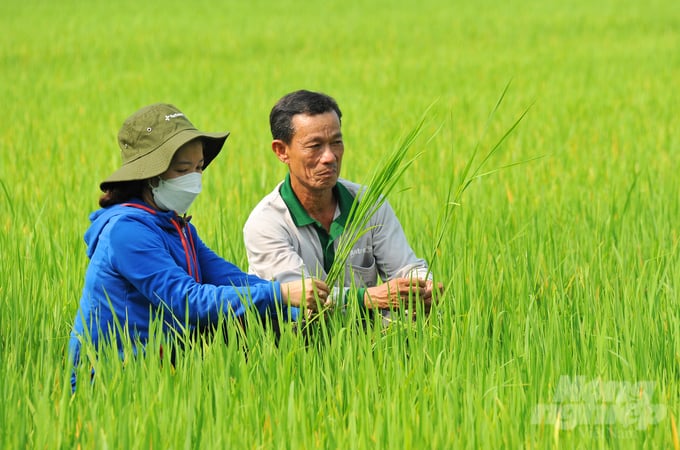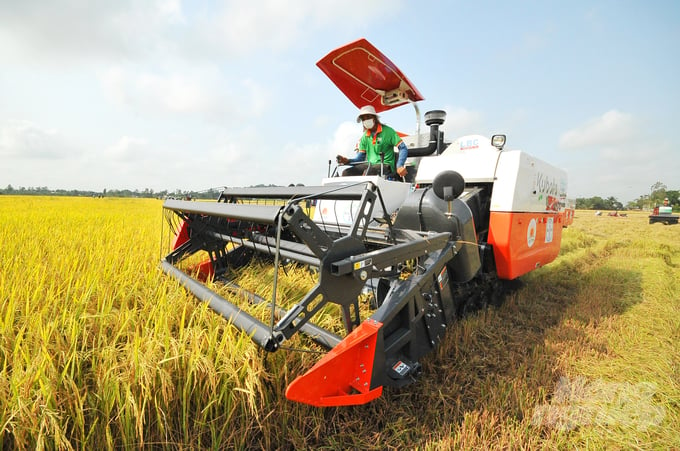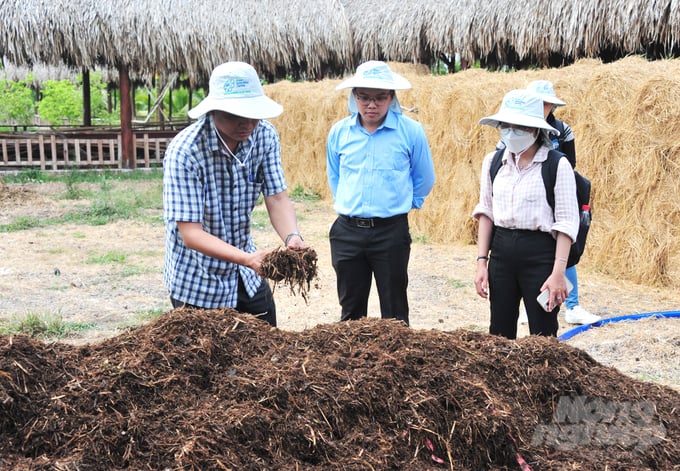May 20, 2025 | 09:13 GMT +7
May 20, 2025 | 09:13 GMT +7
Hotline: 0913.378.918
May 20, 2025 | 09:13 GMT +7
Hotline: 0913.378.918

The GIC project has assisted Tien Dung Cooperative in organizing the Farmer Business School (FBS) initiative, thereby significantly enhancing farmers' knowledge in management, administration, and business linkage. Photo: Le Hoang Vu.
Can Tho City, located in the heart of the Mekong Delta region, is a key agricultural area in Vietnam. With favorable natural conditions for agricultural development, the city has established and developed multiple agricultural cooperatives. To date, the city hosts 183 cooperatives, with a strong focus on crop production, particularly fruit trees and rice.
These cooperatives focus primarily on crop production, which accounts for 78% of their activities, with fruit trees and rice being the most prominent products. Livestock production constitutes only 2.7% of their activities, fisheries 9.8%, and other services 9.3%.
According to Can Tho City's Department of Agriculture and Rural Development, the number of cooperative members within the city has grown to 3,293 in 2024, which is an increase of 653 members from 2021. This growth reflects a trend towards greater engagement through service use rather than formal membership.
Notably, 80% of the local cooperative members are educated in cooperative laws, and 60% actively participate in cooperative development. The total charter capital of the cooperatives currently stands at over 172.4 billion VND, an increase of more than 38 billion VND compared to 2021. The average charter capital per cooperative is 989 million VND, and the average member contribution is 52.3 million VND. Most members have contributed capital as required, with a contribution rate of 56.4% according to the charter capital.
Cooperatives are predominantly managed through a combined model of Board of Directors and Executive Board. This model is currently applied to over 91% of all cooperatives due to limitations in expertise and revenue. On the other hand, at least 52 cooperatives collaborate with local companies for product consumption every year, which further motivates other members to engage in their cooperative's activities.

Green innovations can enhance farmers' and cooperatives' competitiveness, improve production processes, and optimize supply chains. Photo: Le Hoang Vu.
The Ministry of Agriculture and Rural Development recently selected Can Tho City as one of six provinces and cities in the Mekong Delta region (alongside Kien Giang, An Giang, Dong Thap, Hau Giang, Soc Trang, and Can Tho) to participate in the "Green Innovation Centers Project 2021-2024" (GIC). The GIC project aims to promote and expand innovative models and solutions through various agricultural products, contributing to sustainable rural development in the Mekong Delta.
Nhan Loi Agricultural Service Cooperative in Thanh Loc Commune, Vinh Thanh District, is one of ten cooperatives in Can Tho City participating in the GIC project. The project has supported the cooperative with several activities, including providing a fertilizer turning machine to produce organic substrates from straw, which enables rice farmers to improve the quality of their products and addresses issues related to straw burning.
According to Tieu Ngoc Loi, Director of Nhan Loi Agricultural Service Cooperative, the model of utilizing straw to grow straw mushrooms has yielded substantial economic benefits for local farmers both within and outside the cooperative.
A local household produces approximately ten mushroom crops a year, using approximately 200 tons of straw. Each crop yields 700 kilograms of mushrooms on average. With a selling price ranging from 50,000 to 60,000 VND per kilogram, farmers can expect a profit ranging from 5 to 20 million VND per crop after expenses. Consequently, the model not only utilizes rice byproducts but also increases farmers' incomes. Additionally, after each mushroom crop (which uses approximately 550 rolls of straw), farmers can sell the remaining decomposed straw to nurseries to use as covers for plant roots (such as plum, lemon, and grapefruit) at a price of 2,500 to 33,000 VND per roll.

The GIC project has provided Nhan Loi Cooperative with a fertilizer turning machine to produce organic substrates from straw, which enables rice farmers to improve the quality of their products. Photo: Le Hoang Vu.
Regarding the enhancement of linkages and agricultural product consumption during and after participating in the project, GIC has assisted Tien Dung Cooperative in organizing the Farmer Business School (FBS) initiative. The program has improved farmers' knowledge in management, administration, business linkages, mid-term planning, financial management, and marketing.
Nguyen Tan Nhan, Deputy Director of Can Tho City's Department of Agriculture and Rural Development, stated that the adoption of green innovations in management and service organization is a necessary trend to enhance the competitiveness of farmers and agricultural cooperatives in Can Tho. This approach improves production processes and optimizes supply chains. Moreover, the adoption of modern technology, improved management, and development of new business models helps cooperatives meet market demands and promotes the sustainable development of the local agricultural sector.
Translated by Nguyen Hai Long

(VAN) Vietnam aims to become a 'leader' in the region in the capacity and managing effectively soil health and crop nutrition.
![Reducing emissions from rice fields: [Part 1] Farming clean rice together](https://t.ex-cdn.com/nongnghiepmoitruong.vn/608w/files/news/2025/05/05/z6509661417740_a647202949c539012a959e841c03e1d3-nongnghiep-143611.jpg)
(VAN) Growing clean rice helps reduce environmental pollution while increasing income, allowing farmers to feel secure in production and remain committed to their fields for the long term.
/2025/05/19/5136-1-144800_230.jpg)
(VAN) The Nghe An Provincial People's Committee has just approved the list of beneficiaries eligible for revenue from the Emission Reductions Payment Agreement (ERPA) in the North Central region for the year 2025.

(VAN) 14 out of 35 domesticated elephants in Dak Lak province have had their living conditions improved, with 11 of them currently participating in the non-riding elephant tourism model.

(VAN) Muong Nhe Nature Reserve hopes that being upgraded to a national park will lay the foundation for forest protection efforts to be carried out in a systematic, modern, and sustainable manner.
/2025/05/16/3923-2-171845_52.jpg)
(VAN) Lower costs, higher yields, and improved soil quality are outstanding benefits that soybeans bring when integrated into the crop rotation system.

(VAN) The 'For a Green National Environment' programme aims to promote a green lifestyle, support businesses in implementing ESG practices, and turn Net Zero commitments into concrete actions.